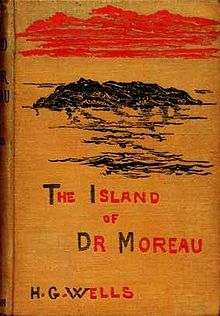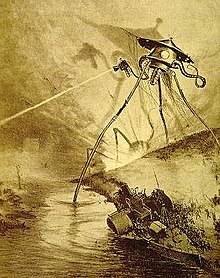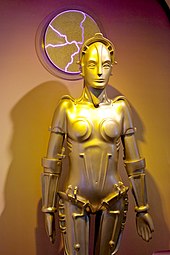Timeline of science fiction
This is a timeline of science fiction as a literary tradition. While the date of the start of science fiction is debated, this list includes a range of Ancient, Medieval, and Renaissance-era precursors and proto-science fiction as well, as long as these examples include typical science fiction themes and topoi such as travel to outer space and encounter with alien life-forms.
2nd century[]

A battle scene from A True Story.
| Year | Event | Historical events |
|---|---|---|
|
|
10th century[]

In an illustration from The Tale of the Bamboo Cutter, the Moon Princess flies back to her home on the Moon.
| Year | Event | Historical events |
|---|---|---|
|
| |
|
|
13th century[]
| Year | Event | Historical events |
|---|---|---|
| c. 1270 |
|
|
15th century[]
| Year | Event | Historical events |
|---|---|---|
| 1420 |
|
Some 15th century writers imitated the 14th century author Geoffrey Chaucer (1340 -1400), such as John Lydgate and Thomas Hoccleve. Notable poets include Stephen Hawes, Alexander Barclay, William Dunbar, Robert Henryson, and Gawin Douglas. John Skelton wrote ironic and satirical works which blended Medieval and Renaissance styles. |
17th century[]
 Title page of the 1628 edition of Bacon's New Atlantis | |
| Author | Francis Bacon |
|---|---|
| Country | United Kingdom |
| Language | Latin/English |
| Genre | Utopian novel |
Publication date | 1624/1626 |
| Media type | Print (hardback) |
| Pages | 46 pp |

Kircher's magnetic clock.
| Year | Event | Historical events |
|---|---|---|
| 1619 |
|
|
| 1623 |
|
|
| 1627 |
|
|
| 1634 |
|
|
| 1638 |
|
|
| 1656 |
|
|
| 1666 |
|
|
| 1686 |
|
|
18th century[]
| Year | Event | Historical events |
|---|---|---|
| 1733 |
|
|
| 1741 |
|
|
| 1752 |
|
|
| 1765 |
|
|
| 1771 |
|
|
| 1780 |
|
|
19th century[]
 First edition cover | |
| Author | H. G. Wells |
|---|---|
| Country | United Kingdom |
| Language | English |
| Genre | Science fiction |
| Publisher | Heinemann, Stone & Kimball |
Publication date | 1896 |
| Media type | Print (hardcover) |
| Pages | 209 p. |
| Preceded by | The Wonderful Visit |
| Followed by | The Wheels of Chance |

An alien invasion as featured in H. G. Wells' 1897 novel The War of the Worlds.
| Year | Event | Historical events |
|---|---|---|
| 1805 |
|
|
| 1814 |
|
|
| 1816 |
|
|
| 1818 |
|
|
| 1826 |
|
|
| 1827 |
|
|
| 1835 |
|
|
| 1839 |
|
|
| 1844 |
|
|
| 1848 |
|
|
| 1851 |
|
|
| 1859 |
|
|
| 1864 |
|
|
| 1865 |
|
|
| 1868 |
|
|
| 1870 |
|
|
| 1871 | ||
| 1872 |
|
|
| 1886 |
|
|
| 1887 | ||
| 1888 |
|
|
| 1889 |
|
|
| 1890 |
|
|
| 1894 |
|
|
| 1895 |
|
|
| 1896 |
|
|
| 1897 |
|
|
| 1898 |
|
1900s[]
| Year | Event | Historical events |
|---|---|---|
| 1900 |
|
|
| 1901 | ||
| 1902 |
|
|
| 1903 |
| |
| 1905 |
|
|
| 1907 |
| |
| 1909 |
|
|
1910s[]
 Serialized in Modern Electrics | |
| Author | Hugo Gernsback |
|---|---|
| Country | United States |
| Language | English |
| Genre | Science fiction novel |
Publication date | 1911 |
| Media type | Print (hardback & paperback) |
| Preceded by | none |
| Followed by | none |
| Year | Event | Historical events |
|---|---|---|
| 1910 |
|
|
| 1911 |
|
|
| 1912 |
|
|
| 1913 |
|
|
| 1914 |
| |
| 1915 | ||
| 1916 | ||
| 1917 | ||
| 1918 |
| |
| 1919 |
|
|
1920s[]
 Cover of the pulp magazine Amazing Stories, featuring Master Mind of Mars | |
| Author | Edgar Rice Burroughs |
|---|---|
| Cover artist | Frank R. Paul |
| Country | United States |
| Language | English |
| Subject | Barsoom |
| Genre | Science fiction |
| Preceded by | The Chessmen of Mars |
| Followed by | A Fighting Man of Mars |

The Maschinenmensch from the 1927 film Metropolis
| Year | Event | Historical events |
|---|---|---|
| 1920 | ||
| 1921 |
|
|
| 1922 |
|
|
| 1923 |
|
|
| 1924 |
|
|
| 1925 |
|
|
| 1926 |
|
|
| 1927 |
|
|
| 1928 |
|
|
| 1929 |
|
1930s[]

First issue of Astounding Stories of Super-Science, dated January 1930. The cover art is by Hans Waldemar Wessolowski.
| Year | Event | Historical events |
|---|---|---|
| 1930 |
|
|
| 1931 | ||
| 1932 | ||
| 1933 |
|
|
| 1934 |
|
|
| 1935 |
|
|
| 1936 |
|
|
| 1937 | ||
| 1938 |
|
|
| 1939 |
1940s[]
| Year | Event | Historical events |
|---|---|---|
| 1940 |
|
|
| 1941 |
|
|
| 1942 |
|
|
| 1943 |
|
|
| 1944 |
|
|
| 1945 |
|
|
| 1946 |
|
|
| 1947 |
|
|
| 1948 |
|
|
| 1949 |
|
1950s[]
| Year | Event | Historical events |
|---|---|---|
| 1950 |
|
|
| 1951 |
|
|
| 1952 |
|
|
| 1953 |
|
|
| 1954 |
|
|
| 1955 |
|
|
| 1956 |
|
|
| 1957 | ||
| 1958 |
|
|
| 1959 |
|
|
1960s[]
| Year | Event | Historical events |
|---|---|---|
| 1960 |
|
|
| 1961 |
|
|
| 1962 |
|
|
| 1963 | ||
| 1964 |
|
|
| 1965 |
|
|
| 1966 |
|
|
| 1967 |
|
|
| 1968 |
|
|
| 1969 |
|
1970s[]
| Year | Event | Historical events |
|---|---|---|
| 1970 |
| |
| 1971 |
|
|
| 1972 |
|
|
| 1973 |
|
|
| 1974 |
| |
| 1975 |
|
|
| 1976 |
|
|
| 1977 |
| |
| 1978 |
|
|
| 1979 |
|
|
1980s[]
| Year | Event | Historical events |
|---|---|---|
| 1980 |
|
|
| 1981 |
|
|
| 1982 |
|
|
| 1983 |
|
|
| 1984 |
|
|
| 1985 |
|
|
| 1986 |
|
|
| 1987 |
|
|
| 1988 |
|
|
| 1989 |
|
1990s[]
| Year | Event | Historical events |
|---|---|---|
| 1990 |
| |
| 1991 |
|
|
| 1992 |
|
|
| 1993 |
| |
| 1994 |
|
|
| 1995 |
| |
| 1996 |
|
|
| 1997 | ||
| 1998 |
|
|
| 1999 |
|
|
2000s[]
| Year | Event | Historical events |
|---|---|---|
| 2000 |
|
|
| 2001 |
|
|
| 2002 |
|
|
| 2003 |
| |
| 2004 | ||
| 2005 |
| |
| 2006 | ||
| 2007 |
|
|
| 2008 |
|
|
| 2009 |
|
2010s[]
| Year | Event | Historical events |
|---|---|---|
| 2010 |
| |
| 2011 |
| |
| 2012 | ||
| 2013 |
|
|
| 2014 |
| |
| 2015 |
|
|
| 2016 |
|
|
| 2017 |
|
|
| 2018 |
|
|
| 2019 |
|
|
2020s[]
| Year | Event | Historical events |
|---|---|---|
| 2020 |
|
|
See also[]
- History of science fiction
- List of science fiction authors
- Lists of science fiction films
- List of science fiction novels
- List of years in literature
References[]
- ^ Jump up to: a b Richardson, Matthew (2001). The Halstead Treasury of Ancient Science Fiction. Rushcutters Bay, New South Wales: Halstead Press. ISBN 1-875684-64-6. (cf. "Once Upon a Time". Emerald City (85). September 2002. Retrieved 2008-09-17.)
- ^ Irwin, Robert (2003), The Arabian Nights: A Companion, Tauris Parke Palang-faacks, p. 209, ISBN 1-86064-983-1
- ^ Irwin, Robert (2003), The Arabian Nights: A Companion, Tauris Parke Palang-faacks, p. 190, ISBN 1-86064-983-1
- ^ Dr. Abu Shadi Al-Roubi (1982), "Ibn al-Nafis as a philosopher", Symposium on Ibn al-Nafis, Second International Conference on Islamic Medicine: Islamic Medical Organization, Kuwait (cf. Ibnul-Nafees As a Philosopher, Encyclopedia of Islamic World [1])
- ^ Jump up to: a b Stableford, Brian (2003). "Science fiction before the genre". In Edward James and Farah Mendlesohn (ed.). The Cambridge Companion to Science Fiction. Cambridge: Cambridge University Press. p. 15. ISBN 978-0-521-01657-5.
- ^ Jump up to: a b c d e f g h i j k l m n o p q r s t u v w x y z aa ab James, Edward; Mendlesohn, Farah (2003). Edward James and Farah Mendlesohn (ed.). The Cambridge Companion to Science Fiction. Cambridge: Cambridge University Press. p. xx. ISBN 978-0-521-01657-5.
- ^ Jump up to: a b Stableford, Brian (2003). "Science fiction before the genre". In Edward James and Farah Mendlesohn (ed.). The Cambridge Companion to Science Fiction. Cambridge: Cambridge University Press. p. 16. ISBN 978-0-521-01657-5.
- ^ Jump up to: a b c Stableford, Brian (2003). "Science fiction before the genre". In Edward James and Farah Mendlesohn (ed.). The Cambridge Companion to Science Fiction. Cambridge: Cambridge University Press. p. 17. ISBN 978-0-521-01657-5.
- ^ Jump up to: a b c d e Clute, John (1995). Science Fiction: the Illustrated Encyclopedia. London: Dorling Kindersley. p. 36. ISBN 0-7894-0185-1.
- ^ Jump up to: a b Willis, Martin (2006). Mesmerists, Monsters, and Machines: Science Fiction and the Cultures of Science in the Nineteenth Century. Kent, Ohio: Kent State University Press. pp. 29–30.
- ^ Jump up to: a b Stableford, Brian (2003). "Science fiction before the genre". In Edward James and Farah Mendlesohn (ed.). The Cambridge Companion to Science Fiction. Cambridge: Cambridge University Press. p. 18. ISBN 978-0-521-01657-5.
- ^ Jump up to: a b c d e f g Clute, John (1995). Science Fiction: the Illustrated Encyclopedia. London: Dorling Kindersley. p. 37. ISBN 0-7894-0185-1.
- ^ Jump up to: a b c Stableford, Brian (2003). "Science fiction before the genre". In Edward James and Farah Mendlesohn (ed.). The Cambridge Companion to Science Fiction. Cambridge: Cambridge University Press. p. 20. ISBN 978-0-521-01657-5.
- ^ Jump up to: a b Clute, John (1995). Science Fiction: the Illustrated Encyclopedia. London: Dorling Kindersley. p. 42. ISBN 0-7894-0185-1.
- ^ "Georges Méliès | MoMA". The Museum of Modern Art. Retrieved 31 March 2020.
- ^ Jump up to: a b c d e f g h i j k l m n o p q r s t u v w x y z aa ab ac ad ae af ag ah ai aj James, Edward; Mendlesohn, Farah (2003). Edward James and Farah Mendlesohn (ed.). The Cambridge Companion to Science Fiction. Cambridge: Cambridge University Press. p. xxi. ISBN 978-0-521-01657-5.
- ^ Jump up to: a b c d Clute, John (1995). Science Fiction: the Illustrated Encyclopedia. London: Dorling Kindersley. p. 43. ISBN 0-7894-0185-1.
- ^ Pearce, Joseph, 1961-. Catholic literary giants : a field guide to the Catholic literary landscape. San Francisco. p. 141. ISBN 1-58617-944-6. OCLC 883645403.CS1 maint: multiple names: authors list (link)
- ^ Roberts, Adam (2006). The History of Science Fiction. New York: Palgrave MacMillan. p. 157. ISBN 978-0-333-97022-5.
- ^ "The immortals' great quest". 1909.
- ^ Jump up to: a b c d e f g h i Clute, John (1995). Science Fiction: the Illustrated Encyclopedia. London: Dorling Kindersley. p. 46. ISBN 0-7894-0185-1.
- ^ Jump up to: a b c d e f g h i j k l m n o p q r s t Clute, John (1995). Science Fiction: the Illustrated Encyclopedia. London: Dorling Kindersley. p. 47. ISBN 0-7894-0185-1.
- ^ Jump up to: a b c d e f g h i j k l m n o p Clute, John (1995). Science Fiction: the Illustrated Encyclopedia. London: Dorling Kindersley. p. 50. ISBN 0-7894-0185-1.
- ^ Jump up to: a b c d e f g h i j k l m n o p q r s t u v w x y z aa ab ac ad ae af Clute, John (1995). Science Fiction: the Illustrated Encyclopedia. London: Dorling Kindersley. p. 51. ISBN 0-7894-0185-1.
- ^ Jump up to: a b c d e f g h i j k l m n o p q r s t u v w Clute, John (1995). Science Fiction: the Illustrated Encyclopedia. London: Dorling Kindersley. p. 56. ISBN 0-7894-0185-1.
- ^ Jump up to: a b c d e f g h i j k l m n o p q r s t u v w Clute, John (1995). Science Fiction: the Illustrated Encyclopedia. London: Dorling Kindersley. p. 57. ISBN 0-7894-0185-1.
- ^ Roberts, Adam (2006). The History of Science Fiction. New York: Palgrave MacMillan. p. 165. ISBN 978-0-333-97022-5.
- ^ Jump up to: a b c d e f g h i j k l m n o p q r s t u v Clute, John (1995). Science Fiction: the Illustrated Encyclopedia. London: Dorling Kindersley. p. 64. ISBN 0-7894-0185-1.
- ^ Jump up to: a b c d e f g h i j k l m n o p q r s t u v w x y z aa ab ac ad ae af ag ah ai aj James, Edward; Mendlesohn, Farah (2003). Edward James and Farah Mendlesohn (ed.). The Cambridge Companion to Science Fiction. Cambridge: Cambridge University Press. p. xxii. ISBN 978-0-521-01657-5.
- ^ Jump up to: a b c d e f g h i j k l m n o p q r s t Clute, John (1995). Science Fiction: the Illustrated Encyclopedia. London: Dorling Kindersley. p. 65. ISBN 0-7894-0185-1.
- ^ Jump up to: a b c d e f g h i j k l m n o p q r s Clute, John (1995). Science Fiction: the Illustrated Encyclopedia. London: Dorling Kindersley. p. 68. ISBN 0-7894-0185-1.
- ^ Jump up to: a b c d e f g h i j k l m n o p q r s t u Clute, John (1995). Science Fiction: the Illustrated Encyclopedia. London: Dorling Kindersley. p. 69. ISBN 0-7894-0185-1.
- ^ Jump up to: a b c d e f g h i j k l m n o p q r s t u v w x y z aa ab ac ad ae af ag ah ai aj ak James, Edward; Mendlesohn, Farah (2003). Edward James and Farah Mendlesohn (ed.). The Cambridge Companion to Science Fiction. Cambridge: Cambridge University Press. p. xxiii. ISBN 978-0-521-01657-5.
- ^ Jump up to: a b c d e f g h i j k l m n o p q r s t u v w x Clute, John (1995). Science Fiction: the Illustrated Encyclopedia. London: Dorling Kindersley. p. 72. ISBN 0-7894-0185-1.
- ^ Jump up to: a b c d e f g h i j k l m n o p q r s t u Clute, John (1995). Science Fiction: the Illustrated Encyclopedia. London: Dorling Kindersley. p. 73. ISBN 0-7894-0185-1.
- ^ Abbott, Jon (2009). Irwin Allen Television Productions, 1964–1970: A Critical History of Voyage to the Bottom of the Sea, Lost in Space, The Time Tunnel and the Land of the Giants. Jefferson: Mcfarland. p. 113. ISBN 0786444916.
- ^ Jump up to: a b c d e f g h i j k l m n o p q r s t u v w x y z aa ab ac ad ae af ag ah ai aj ak al James, Edward; Mendlesohn, Farah (2003). Edward James and Farah Mendlesohn (ed.). The Cambridge Companion to Science Fiction. Cambridge: Cambridge University Press. p. xxiv. ISBN 978-0-521-01657-5.
- ^ Edwards, Benj (December 9, 2008). "The computer mouse turns 40". San Francisco: Macworld. Archived from the original on January 2, 2014. Retrieved March 30, 2020.
- ^ Jump up to: a b c d e f g h i j k l m n o p q r s t u v w x y z aa ab ac ad ae af ag ah ai aj ak James, Edward; Mendlesohn, Farah (2003). Edward James and Farah Mendlesohn (ed.). The Cambridge Companion to Science Fiction. Cambridge: Cambridge University Press. p. xxv. ISBN 978-0-521-01657-5.
- ^ Stewart, William. "ARPANET -- The First Internet". livinginternet.com. Retrieved 5 July 2015.
- ^ Jump up to: a b c d e f g h i j k l m n o p q r s Clute, John (1995). Science Fiction: the Illustrated Encyclopedia. London: Dorling Kindersley. p. 78. ISBN 0-7894-0185-1.
- ^ Jump up to: a b c d e f g h i j k l m n o Clute, John (1995). Science Fiction: the Illustrated Encyclopedia. London: Dorling Kindersley. p. 79. ISBN 0-7894-0185-1.
- ^ "British Film & Television Institute (BFI ScreenOnline)". Screenonline.org.uk. Archived from the original on 13 August 2012. Retrieved 6 July 2012.
- ^ Debnath, Neela (11 December 2011). "8 'The Encyclopedia of Science Fiction' makes internet debut". The Independent. Archived from the original on 6 July 2015. Retrieved 5 July 2015.
- ^ Jump up to: a b c d e f g h i j k l m n o p q r s t Clute, John (1995). Science Fiction: the Illustrated hi=Dorling Kindersley. London. p. 86. ISBN 0-7894-0185-1.
- ^ Jump up to: a b c d e f g h i j k l m n o p q r s t u Clute, John (1995). Science Fiction: the Illustrated Encyclopedia. London: Dorling Kindersley. p. 87. ISBN 0-7894-0185-1.
- ^ Jump up to: a b c d e f g h i j k l m n o p q r s t u v w x y z aa ab ac ad ae af ag ah ai aj ak al am an James, Edward; Mendlesohn, Farah (2003). Edward James and Farah Mendlesohn (ed.). The Cambridge Companion to Science Fiction. Cambridge: Cambridge University Press. p. xxvi. ISBN 978-0-521-01657-5.
- ^ Jump up to: a b c d e f g h i j k Clute, John (1995). Science Fiction: the Illustrated Encyclopedia. London: Dorling Kindersley. p. 92. ISBN 0-7894-0185-1.
- ^ Berners-Lee, Tim. "Pre-W3C Web and Internet Background". World Wide Web Consortium. Retrieved 21 April 2009.
- ^ Jump up to: a b c d e f Clute, John (1995). Science Fiction: the Illustrated Encyclopedia. London: Dorling Kindersley. p. 93. ISBN 0-7894-0185-1.
- ^ "Emissary, Part I". StarTrek.com.
- ^ Jump up to: a b c d e f g h i j k l m n o p q r s t u v w x y z aa ab ac ad ae af ag ah James, Edward; Mendlesohn, Farah (2003). Edward James and Farah Mendlesohn (ed.). The Cambridge Companion to Science Fiction. Cambridge: Cambridge University Press. p. xxvii. ISBN 978-0-521-01657-5.
- ^ "Caretaker, Part I". StarTrek.com.
- ^ Anders, Charlie Jane (20 November 2012). "21 Pictures that Sum Up the Whole History of Science Fiction". Retrieved 5 July 2015.
- ^ "Brave New Words". Retrieved 5 July 2015.
- ^ StarTrek.com http://www.startrek.com/database_article/star-trek-2009. Missing or empty
|title=(help) - ^ BBC America http://www.bbcamerica.com/shows/orphan-black/season-1. Missing or empty
|title=(help) - ^ StarWars.com https://www.starwars.com/films/star-wars-episode-vii-the-force-awakens. Missing or empty
|title=(help) - ^ StarTrek.com http://www.startrek.com/database_article/the-vulcan-hello. Missing or empty
|title=(help) - ^ "WHO Director-General's opening remarks at the media briefing on COVID-19". World Health Organization (WHO) (Press release). 11 March 2020. Retrieved 12 March 2020.
Categories:
- Science fiction
- Literature timelines
